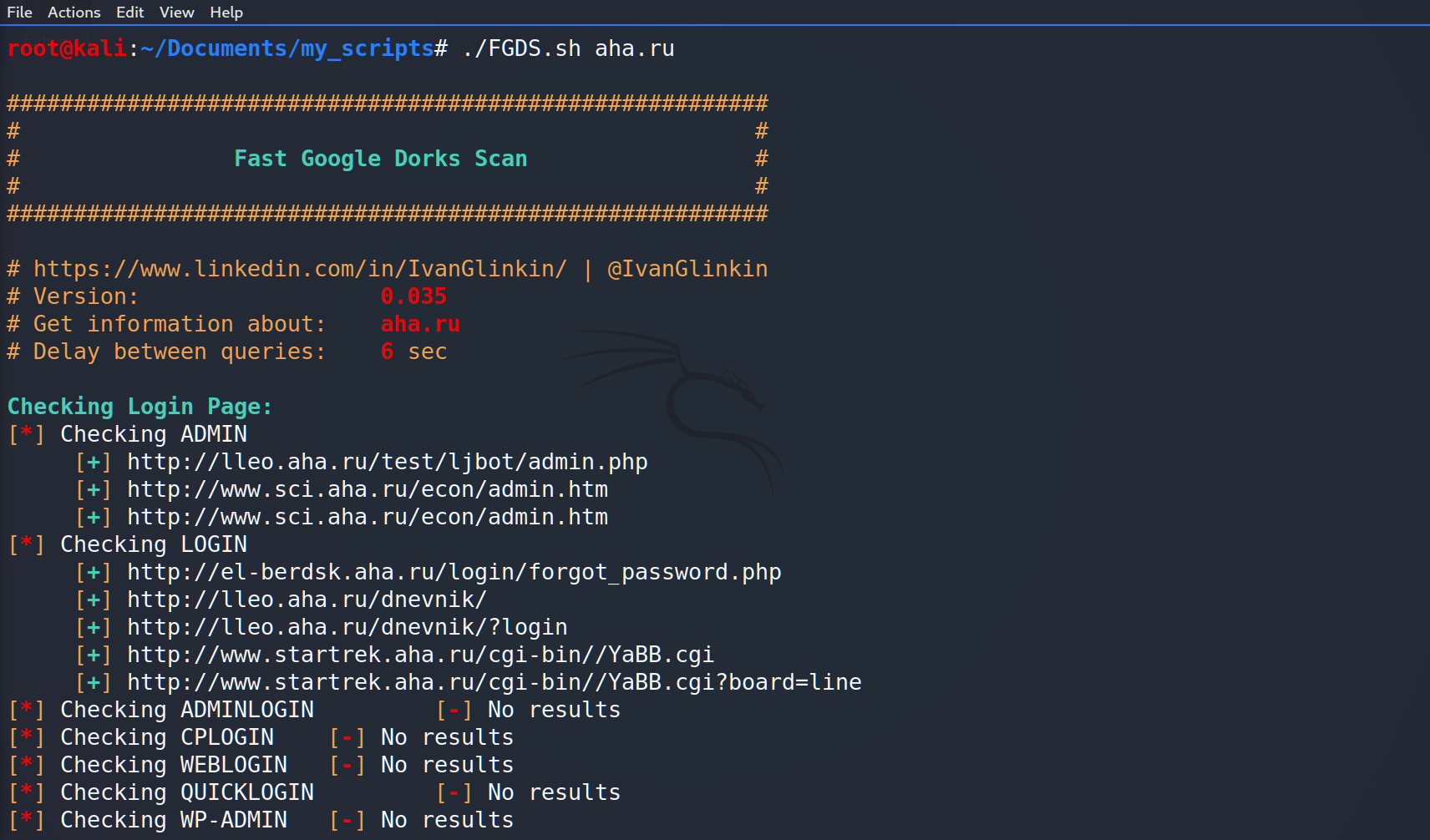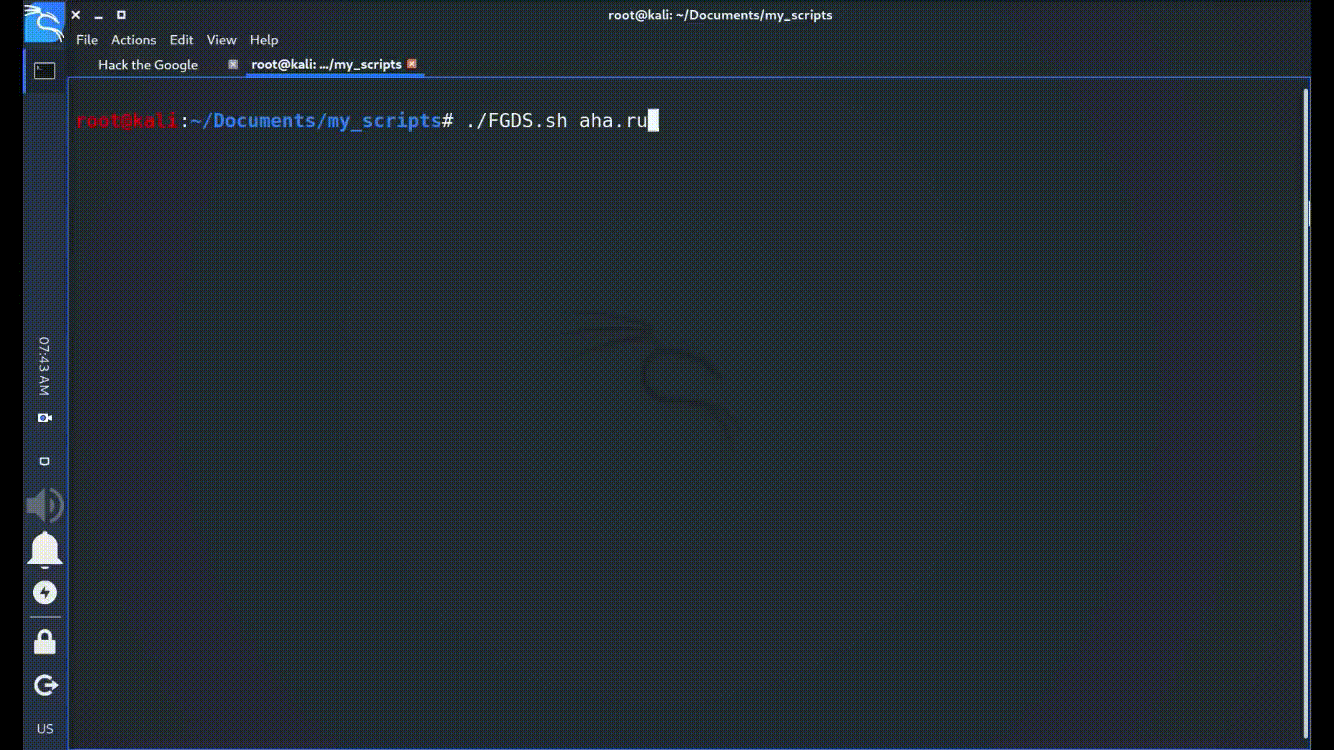Fast Google Dorks Scan is the first program to enumerate all possible dorks to the specific web-site.
It allows you to find the common admin panels, the widespread file types and path traversal.
Just launch the script and it will do it for you 😉
The GitHub repository is via the link – https://github.com/IvanGlinkin/Fast-Google-Dorks-Scan
The full code is below.
#!/bin/bash
# A script to enumerate web-sites using google dorks
# Author: Ivan Glinkin
# Contact: ivan.o.glinkin@gmail.com
# Release date: May 3, 2020
# Variables
## General
version=”0.035″ ## Version Year.Day
updatedate=”May 18,2020″ ## The date of the last update
example_domain=”megacorp.one” ## Example domain
sleeptime=6 ## Delay between queries, in seconds
domain=$1 ## Get the domain
browser=’Mozilla/5.0_(MSIE;_Windows_11)’ ## Browser information for curl
gsite=”site:$domain” ## Google Site
## Login pages
lpadmin=”inurl:admin”
lplogin=”inurl:login”
lpadminlogin=”inurl:adminlogin”
lpcplogin=”inurl:cplogin”
lpweblogin=”inurl:weblogin”
lpquicklogin=”inurl:quicklogin”
lpwp1=”inurl:wp-admin”
lpwp2=”inurl:wp-login”
lpportal=”inurl:portal”
lpuserportal=”inurl:userportal”
lploginpanel=”inurl:loginpanel”
lpmemberlogin=”inurl:memberlogin”
lpremote=”inurl:remote”
lpdashboard=”inurl:dashboard”
lpauth=”inurl:auth”
lpexc=”inurl:exchange”
lpfp=”inurl:ForgotPassword”
lptest=”inurl:test”
loginpagearray=($lpadmin $lplogin $lpadminlogin $lpcplogin $lpweblogin $lpquicklogin $lpwp1 $lpwp2 $lpportal $lpuserportal $lploginpanel $memberlogin $lpremote $lpdashboard $lpauth $lpexc $lpfp $lptest)
## Filetypes
ftdoc=”filetype:doc” ## Filetype DOC (MsWord 97-2003)
ftdocx=”filetype:docx” ## Filetype DOCX (MsWord 2007+)
ftxls=”filetype:xls” ## Filetype XLS (MsExcel 97-2003)
ftxlsx=”filetype:xlsx” ## Filetype XLSX (MsExcel 2007+)
ftppt=”filetype:ppt” ## Filetype PPT (MsPowerPoint 97-2003)
ftpptx=”filetype:pptx” ## Filetype PPTX (MsPowerPoint 2007+)
ftmdb=”filetype:mdb” ## Filetype MDB (Ms Access)
ftpdf=”filetype:pdf” ## Filetype PDF
ftsql=”filetype:sql” ## Filetype SQL
fttxt=”filetype:txt” ## Filetype TXT
ftrtf=”filetype:rtf” ## Filetype RTF
ftcsv=”filetype:csv” ## Filetype CSV
ftxml=”filetype:xml” ## Filetype XML
ftconf=”filetype:conf” ## Filetype CONF
ftdat=”filetype:dat” ## Filetype DAT
ftini=”filetype:ini” ## Filetype INI
ftlog=”filetype:log” ## Filetype LOG
ftidrsa=”index%20of:id_rsa%20id_rsa.pub” ## File ID_RSA
filetypesarray=($ftdoc $ftdocx $ftxls $ftxlsx $ftppt $ftpptx $ftmdb $ftpdf $ftsql $fttxt $ftrtf $ftcsv $ftxml $ftconf $ftdat $ftini $ftlog $ftidrsa)
## Directory traversal
dtparent=’intitle:%22index%20of%22%20%22parent%20directory%22′ ## Common traversal
dtdcim=’intitle:%22index%20of%22%20%22DCIM%22′ ## Photo
dtftp=’intitle:%22index%20of%22%20%22ftp%22′ ## FTP
dtbackup=’intitle:%22index%20of%22%20%22backup%22′ ## BackUp
dtmail=’intitle:%22index%20of%22%20%22mail%22′ ## Mail
dtpassword=’intitle:%22index%20of%22%20%22password%22′ ## Password
dtpub=’intitle:%22index%20of%22%20%22pub%22′ ## Pub
dirtravarray=($dtparent $dtdcim $dtftp $dtbackup $dtmail $dtpassword $dtpub)
# Header
echo -e “\n\e[00;33m#########################################################\e[00m”
echo -e “\e[00;33m# #\e[00m”
echo -e “\e[00;33m#\e[00m” “\e[01;32m Fast Google Dorks Scan \e[00m” “\e[00;33m#\e[00m”
echo -e “\e[00;33m# #\e[00m”
echo -e “\e[00;33m#########################################################\e[00m”
echo -e “”
echo -e “\e[00;33m# https://www.linkedin.com/in/IvanGlinkin/ | @IvanGlinkin\e[00m”
# Check domain
if [ -z “$domain” ]
then
echo -e “\e[00;33m# Usage example:\e[00m” “\e[01;31m$0 $example_domain \e[00m\n”
exit
else
echo -e “\e[00;33m# Get information about: \e[00m” “\e[01;31m$domain\e[00m”
echo -e “\e[00;33m# Delay between queries: \e[00m” “\e[01;31m$sleeptime\e[00m” “\e[00;33msec\e[00m\n”
fi
### Function to get information about site ### START
function Query {
result=””;
for start in `seq 0 10 40`; ##### Last number – quantity of possible answers
do
query=$(echo; curl -sS -A $browser “https://www.google.com/search?q=$gsite%20$1&start=$start&client=firefox-b-e”)
checkban=$(echo $query | grep -io “https://www.google.com/sorry/index”)
if [ “$checkban” == “https://www.google.com/sorry/index” ]
then
echo -e “Google thinks you are the robot and has banned you;) How dare he? So, you have to wait some time to unban or change your ip!”;
exit;
fi
checkdata=$(echo $query | grep -Eo “(http|https)://[a-zA-Z0-9./?=_~-]*$domain/[a-zA-Z0-9./?=_~-]*”)
if [ -z “$checkdata” ]
then
sleep $sleeptime; # Sleep to prevent banning
break; # Exit the loop
else
result+=”$checkdata “;
sleep $sleeptime; # Sleep to prevent banning
fi
done
### Echo results
if [ -z “$result” ]
then
echo -e “\e[00;33m[\e[00m\e[01;31m-\e[00m\e[00;33m]\e[00m No results”
else
IFS=$’\n’ sorted=($(sort -u <<<“${result[@]}” | tr ” ” “\n”)) # Sort the results with unique key
echo -e ” “
for each in “${sorted[@]}”; do echo -e ” \e[00;33m[\e[00m\e[01;32m+\e[00m\e[00;33m]\e[00m $each”; done
fi
### Unset variables
unset IFS sorted result checkdata checkban query
}
### Function to get information about site ### END
### Function to print the results ### START
function PrintTheResults {
for dirtrav in $@;
do echo -en “\e[00;33m[\e[00m\e[01;31m*\e[00m\e[00;33m]\e[00m” Checking $(echo $dirtrav | cut -d “:” -f 2 | tr ‘[:lower:]’ ‘[:upper:]’ | sed “s@+@ @g;s@%@\\\\x@g” | xargs -0 printf “%b”) “\t”
Query $dirtrav
done
echo ” “
}
### Function to print the results ### END
# Exploit
echo -e “\e[01;32mChecking Login Page:\e[00m”; PrintTheResults “${loginpagearray[@]}”;
echo -e “\e[01;32mChecking specific files:\e[00m”; PrintTheResults “${filetypesarray[@]}”;
echo -e “\e[01;32mChecking path traversal:\e[00m”; PrintTheResults “${dirtravarray[@]}”;
Now, let’s launch the script:

